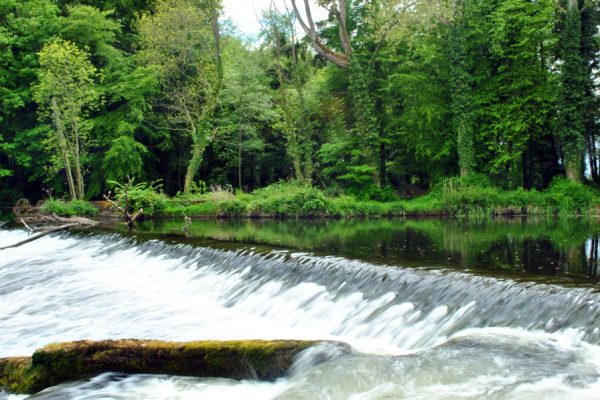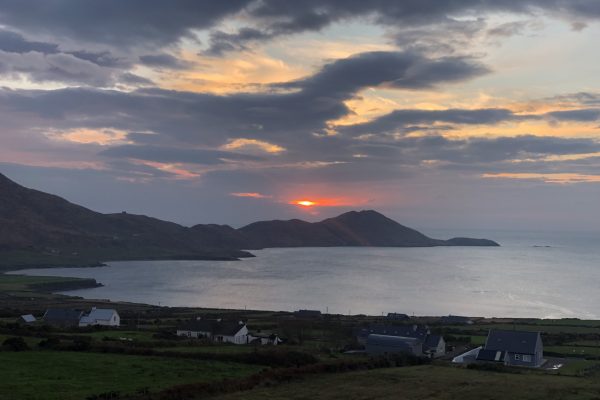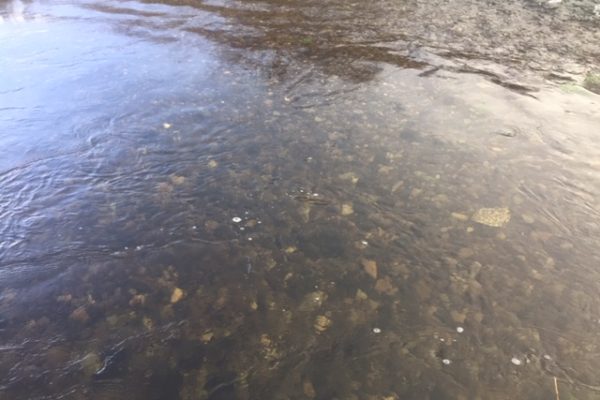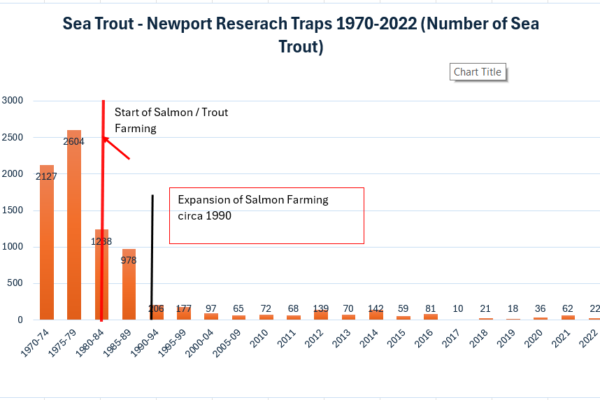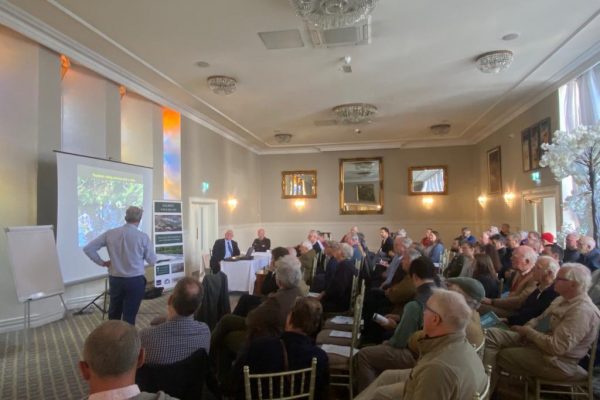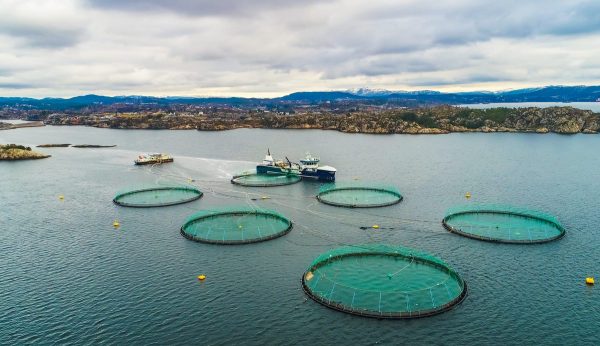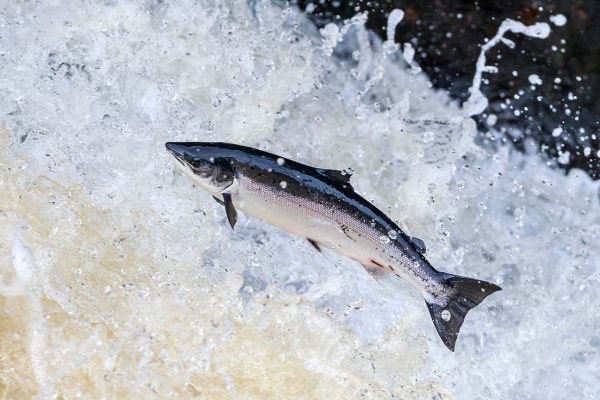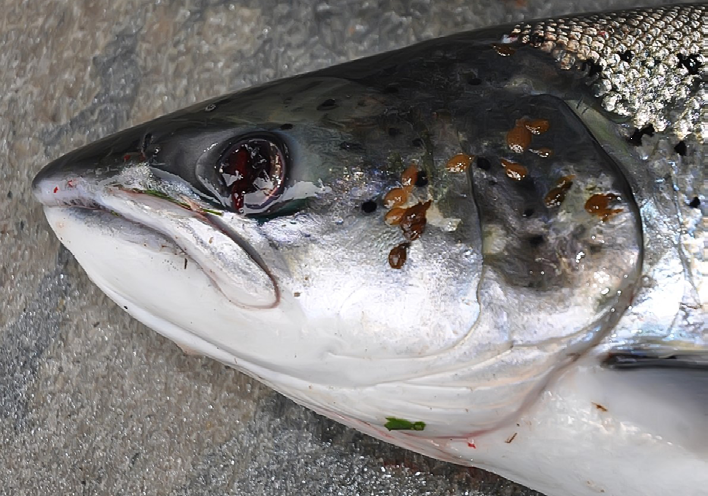-
Barriers Report – Joint Oireactas Committee
The Committee agreed to examine the issue of barriers to fish migration in Irish rivers as part of its 2024 work programme. The Committee held a number of public engagements and received written submissions on this issue and acknowledged the difficult balance between flood risk management and conservation and enhancement of fish populations.This report contains ten recommendations which the Committee feels will serve to meaningfully address factors inhibiting the effective removal and mitigation of barriers in the Irish river network. Barriers Report 2024
Continue reading -
Atlantic salmon – Coming home earlier, smaller and in a compressed time period
The annual EPA conference took place in June 2024 in Galway. Summarising 70 years of research in the Burishoole Catchment, Elvira De Eyto outlined in a very concise and illuminating video presentation how climate data and water quality have changed within this index catchment over 70 years. Our interest is primarily the data surrounding Atlantic salmon and the presentation demonstrated that wild Atlantic salmon are returning earlier, returning at a smaller size and during a more concentrated time period. Survival from ova to smolt appears relatively stable with less than 1% survival but survival at sea has declined alarmingly. One interesting note is that since the closure of the drift net fishery there has been no increase in survival at sea indicating a substantial decline since 2007. The catchment continues to be below its conservation limit thus compromising the output of smolts from the catchment. The video is well worth watching and given its long term data is essential to our understanding of Atlantic salmon. Burishoole Video There are other video which you may find interesting and these can be viewed here. EPA Conference 2024
Continue reading -
Ballisodare Atlantic Salmon Mortalities
With a large number of mortalities and an ongoing investigation by IFI and the Marine Institute it would suffice to say that to lose up to 900 adult salmon is a tragic outcome for this river. We await the outcome of the investigation but we are aware that it appears that the losses are primarily adult salmon. This may be related to oxygen demand as the river appears to be low over a prolonged period. Larger fish require higher levels of oxygen and large quantities in a relatively small area of a river can trigger stress and lead to secondary infections. Higher water may alleviate this but weakened fish may not survive even if distributed further upstream. There appears to be a rise in water over the past number of days and we will see if this alleviates the situation. While there are reports of a large run through the counter it is apparent that the loss of adult salmon at this scale can have consequences for spawning numbers and that other adult salmon may have a compromised survival chance through stress related secondary infections. We would certainly support an engineering solution to natural barriers if these are deemed to be partly responsible for the mortalities.
Continue reading -
Marine Institute – Sea Trout Collapse
This is a graph of sea trout collapse in the Burishoole system in the west of Ireland. This is a stark reminder that sea trout and salmon farming are mutually exclusive. Salmon farms basically make sea trout survival impossible. This station is operated by the Marine Institute which is in denial of the destruction of wild salmonids by salmon farms. The recent post from Alexandra Morton showing the effect bares a striking resemblance to this. The data source is the annual report of the Newport Research which is publicly available at the following link. Marine Institute Report There is a data set of both salmon and sea trout spanning back to 1970.
Continue reading -
Opening Remarks AGM – Salmon Watch Ireland
Welcome to Salmon Watch Ireland’s AGM for 2023 being conducted by Zoom. This meeting is primarily held to conform with our obligations under the Companies Act. 2023 was again a year primarily dominated by our Judicial Review on the decision to award an aquaculture licence to MOWI in Bantry Bay. Having taken the decision to enter into this legal process it was necessary to devote a considerable amount of time to research our main avenues of approach to the legal process. The Judicial review took place in April/May and was a very complex case involving three separate parties taking the review namely IFI, SWIRL and Sweetman and others including FISSTA. The judgement is still outstanding, and we are certainly concerned at the time period this judgement is taking to finalise. We certainly agree that the hearing of the case was exceedingly fair and indeed comprehensive with all parties given a fair hearing. The judgement is listed for mention again in October, but we may see a judgement at a date earlier. I would like to thank all our directors and indeed our members and supporters who helped to prepare and support us both financially and with advice which enabled us to pursue this case. The 2023 salmon run in Ireland was extremely poor with regard to both grilse, and spring salmon. Certainly, it is probable that it was the lowest return in the time series. It will be interesting to see how this will be reflected in catch statistics and indeed how the fish counter report might illuminate and reinforce our view of stocks. It is also interesting that spring stocks in 2024 suggest extremely poor returns which feeds into the narrative that linkage exists between grilse and MSW stocks in regard to survival at sea in first year. The return of salmon to Ireland is in a very precarious position with stocks now at 10% of historic highs. This is also reflected in most countries supporting Atlantic salmon stocks with UK and Norway showing a similar decline. There is also evidence that the decline in perceived strongholds like Iceland and the Russian Federation is now accelerating and showing a similar worrying trend. The scale and basin wide declines are consistent with oceanic influences which may be related to warming SST which can and does have cascading influence on currents and productivity at sea. It is also worth noting that Baltic salmon saw a dramatic decline in 2023 which would certainly be remote from Atlantic influence, so a climate explanation is suggested. There is also a suggestion that unregulated high seas fisheries directed at Atlantic salmon may be occurring but evidence of this is currently not reliable, but areas of concern are North of Faroes and South of Greenland. These areas are consistent with fisheries for salmon which were carried out by the Faroes and Greenland during 1970s and 1980s. However, the evidence of these fish coming to market is not available. We do know that there are complex reasons which dictate strength of salmon populations but with a background of practical elimination of legal harvest it is not beyond the possibility that other illegal directed fisheries have grown in international waters. This must be investigated by NASCO and must include a directed and well-resourced program going forward. The newest threat to Atlantic salmon is certainly the vast and continuing expansion and strengthening of the pink pacific salmon presence in the North Atlantic. While these fish would appear to present difficulties in freshwater, we would suggest that vast populations of these fish are now at sea in Northeast Atlantic and certainly will further compete with all species in traditional feeding areas for Atlantic salmon. There is anecdotal evidence that pink salmon have reduced other pacific salmon populations through competition in North Pacific. Coming closer to Ireland it is quite evident that we have enormous problems in regard to water quality and other issues related to loss of biodiversity. It is alarming that the regular updates on water quality by the EPA usher in a consistent and robust denial of the role that agriculture plays. The agriculture lobby is strong politically but the derogation situation in regard to organic nitrogen limits will have to be discontinued and SWIRL will be actively promoting its removal. The spectre of lack of investment by the state in wastewater infrastructure is now coming to a head with a renewed investment in housing with consequent overload of already inadequate treatment plants.Again, SWIRL will be seeking to empower local communities to make observations on planning to seek proper and reliable infrastructure. We have also continued to engage in regard to open cage salmon aquaculture with a large number of submissions in regard to renewals of expired licences. We also are still awaiting a determination of our EU complaint against Ireland in relation to legislation surrounding salmon aquaculture. The issue of mortalities on Irish salmon farms has been consistently mentioned and is outside international norms which is certainly reflective of an industry which should never be operating in Irish waters. Mortalities and disease are certainly indicative of a dangerous near coastal environment which has the probable outcome of many negative outcomes for wild salmonids. SWIRL again has been at the forefront in calling for exploitation being reduced substantially. The commercial harvest of salmon is certainly not consistent with low stock levels and needs to be dis-continued while more protection of salmon from over harvest by other stakeholders is a necessity. Directed conservation is required with larger fish requiring more protection. We still view the allocation of ten tags as being over generous in times where salmon stocks are at such low levels. We have consistently not called for mandatory catch and release in rivers with a surplus, but we certainly cannot be happy in a situation whereby certain stakeholders may be compromising the calculations through inaccurate returns. Accordingly, we have made suggestions on how the process can be improved to increase accuracy. It would not be incorrect to suggest that very few salmon catchments are managed in an effective way. We need a situation where properly resourced management structures on rivers lead to a better outcome for the resource.To this end SWIRL has taken a strategic evaluation of our focus going forward and have decided to endeavour to empower local communities to act in the interests of salmon conservation through practical actions facilitated by resources provided by us. We again facilitated an annual conference and awarded the Salmon Hero Award for the excellent and ongoing work on the Suir Tributaries. The award is in recognition of local community involvement in preserving local salmonid populations through practical actions. These annual conferences serve as a very important information resource to which all stakeholders can engage in and will certainly be continued and expanded. ENDS.
Continue reading -
Salmon Hero Award 2022 – Coomhola Salmon Trust
Mark Boyden receiving the Salmon Hero 2022 Award from John Murphy, Chair Salmon Watch Ireland The very mention of Atlantic salmon in a primary school in Ireland garners the immediate response "Streamscapes" which is the first port of call for educators all over Ireland in matters relating to our rivers and freshwater resources. The excitement generated by the original "Streamscapes" publication among young students is testimony to how the natural world invigorates and excites and this brainchild of the Coomhola Salmon Trust was and still is a beacon of how much this resource was ahead of its time and indeed is still as relevant today. Not confined to Atlantic salmon, Mark Boyden and his team have built an unprecedented educational resource to actively educate school students, community groups and the general public on all matters relating to water quality and the general well being of our freshwater resources. In existence since 1989, the Coomhola Salmon Trust has over the years instilled a life long impact on all its students and community groups in regard to nurturing a respect for Ireland's aquatic and biodiversity heritage. Coomhola Salmon Trust certainly encompasses what all groups interested in the natural environment should aspire to. ENGAGE -ENLIGHTEN - EMPOWER Salmon Watch Ireland is delighted to award the "Salmon Hero Award" to the Coomhola Salmon Trust for 2022 in recognition of their inspirational and lifelong devotion to protecting Ireland's aquatic and biodiversity resources. We cannot recommend more highly the resources and practical innovation that the Trust has demonstrated over the last three decades and would strongly suggest that all parties interested in preserving Ireland's natural resources learn more about this truly unique project. Coomhola Salmon Trust has a myriad of educational publications and has always been at the forefront of protecting Ireland's nature and biodiversity. Coomhola has also a freshwater aquarium built from the unique landscape of the Coomhola catchment which is integrated with the Coomhola River. All the resources can be accessed at Streamscapes Resources and Publications A Selection of Publications from Coomhola Salmon Trust To access more about streamscapes please click on following link: Streamscapes Website
Continue reading -
Two Government departments are at odds over regulation of salmon farms in the Republic. Just a small piece of the extensive articles in today’s Irish Times written by Kevin O Sullivan, Environment and Science Editor and former editor of The Irish Times. Well worth a read and it clearly states the differing opinions regarding salmon farming. We fully support the position of the Department of Environment, Climate Change and Communications and Inland Fisheries Ireland. The Department of Agriculture Food and Marine and the Marine Institute are way out of line with international norms and are clearly green washing the salmon farming industry. Time for a seismic change in policy. Clear divisions have emerged in an exchange of letters between Minister for the Environment Eamon Ryan and Minister for the Marine Charlie McConalogue. In a letter released under Freedom of Information legislation, Mr Ryan accuses Mr McConalogue’s department of operating an aquaculture licensing regime with flawed assessment of fish-farm sites and their potential impact on wild salmon and sea trout. These two species are in sharp decline in Ireland with sea lice from fish farms implicated in their demise. It is understood that Attorney General Paul Gallagher has intervened with the departments to express disquiet at the stand-off over how licence applications are assessed and to underline the need for a resolution. The opposing views are mirrored by a stand-off between two State agencies involved; the Marine Institute, which advises Mr McConalogue on all applications, and Inland Fisheries Ireland (IFI), which is responsible for the protection and conservation of freshwater fish and their habitats. Mr Ryan said the Department of Agriculture, Food and the Marine (DAFM) in assessing applications was over-reliant on an incorrect interpretation of a small number of Marine Institute studies, which run contrary to the main thrust of international peer-reviewed scientific opinion. Mr McConalogue, in his 10-page response, insisted the regulatory regime is fully compliant with the State’s environmental obligations and that “appropriate assessments” are carried out correctly by the Marine Institute. He also robustly defended the way sea lice levels are monitored. Salmon Watch Ireland, which obtained the correspondence, has called for an overhaul of the licensing regime. Its director John Murphy described the stand-off as “an astonishing difference of opinion between two Government departments”. In response to the exchange of letters, the Marine Institute said as scientific advisers to DAFM, it “is fully engaged in the process of providing scientific advice as part of the regulatory system in place in the licensing of aquaculture. The function of this is to develop the aquaculture industry in a sustainable way.” It added in a statement to The Irish Times: “The process of assessment of aquaculture licences for salmon farms is a matter for DAFM. The role of the Marine Institute as scientific advisors is to oversee and/or prepare a report on the appropriate assessment [AA] process and to submit these reports to DAFM as part of the licensing determination process.” ‘Development activities’ The institute’s advisory inputs, it said, “are in line with best practices worldwide” and its scientists “take great care in discharging their responsibilities towards all conservation, protection and development activities in the natural environment”. The clear intention for the AA report prepared for Kenmare Bay was to determine shellfish aquaculture licensing only, it underlined. “It was not sufficient nor was it intended or proffered to enable determination of marine finfish applications [including salmon]. No finfish licensing was determined on the basis of this AA report. Any such applications would be subject to a full AA process specifically focused on finfish [salmon].” On Mr Ryan’s contention that DAFM was over-relying on an incorrect interpretation of a small number of Marine Institute studies which run contrary to international peer-reviewed scientific opinion on impact on wild salmonid stocks, the institute said: “There is an absence of clear evidence exclusively linking sea lice with high mortality rates. International organisations, including ICES (International Council for the Exploration of the Sea) have stated further research is needed to investigate the connection between sea lice infestations and effects on wild salmonids. “Irrespective of the unresolved scientific position, the fact that Ireland has operated an independent national sea lice monitoring programme for nearly 30 years with clear management measures in place, reflects the seriousness which the State takes to any risk posed by sea lice on our wild salmonid populations.” Kevin O'Sullivan
Continue reading -
A rather unique and interesting point of view – Regenerating our salmon and rivers by Nicholas Grubb.
This article encompasses many aspects which Salmon Watch Ireland agree with especially the management of riparian zones. It is an interesting submission which should help to garner an understanding of the many issues prevalent in Ireland regarding the ecosystem management of our river systems. It is interesting to note that management is almost non existent on all our river systems. While ownership of fishery rights are by and large fragmented there is an onus on all interested parties to work together to put in place a professional fishery and ecosystem management system especially on our rivers which produce the majority of smolts. We would also suggest that barriers should be improved to allow easier migration but also agree that large deep water sections may be appropriate in certain rivers. A changing climate scenario is fast approaching and our rivers need sympathetic and ecosystem friendly approaches to improve or indeed protect salmonid productivity. This is a very thought provoking article and the author should be congratulated for his long time unique interest and activism in conservation matters. Dromana House - Lower Blackwater, County Waterford Read More
Continue reading -
Ballinakill Salmon Farm- Submission
Application for licence for an open cage salmon farm at Ballinakill Bay, Co Galway Dear Minister, The documentation submitted by Comhlucht Iascaireachta Fanad Teoranta, (CIFT), trading as MOWI Ireland, seeking a licence for an open cage salmon farm to be sited in Ballinakill Bay, County Galway, falls far short of what is required pursuant to Article 6(3) of the Habitats Directive. Nor can there be reliance on Article 6 (4) thereof, as there are no stated ‘imperative reasons of overriding public interest’, (IROPI), which could justify locating a salmon farm at this sensitive location. The proposed site is within close proximity to the Dawros river mouth. This river forms part of the ‘Twelve Pins Garraun Complex,’ Special Area of Conservation, (Site Code 002031). In this river Wild Atlantic Salmon are a ‘Qualifying Interest.’ Juvenile salmonids, which are already susceptible to mortality from parasitic sea lice from the existing salmon farm in Ballinakill Bay, would be also subject to the cumulative impact of the additional sea lice loading from the proposed MOWI/Marine Harvest salmon farm. No appropriate assessment has ever been conducted in relation to the adverse impact of the existing salmon farm, which is there already. It is suggested that Appropriate Assessment must be conducted on the cumulative effect of both salmon farms before any decision may be reached. Read More - Full Submission
Continue reading -
Management of Tagging System – Submission
The submission from Salmon Watch Ireland in regard to the management of the Salmon and Sea Trout tagging system seeks to offer more protection to spring salmon. To this end SWIRL have suggested some targeted solutions which will effectively conserve salmon. It is essential that commercial salmon fisheries do not exploit spring salmon and that recreational anglers reduce exploitation on these ecological valuable fish. A general tightening of the tagging system is warranted and we have suggested a number of administrative changes to help and streamline the system. It is imperative that we move to a real time online system to guage how stocks are performing. The issue of recreational and commercial exploitation must reflect on how the magnitude of the surplus is related to the conservation limit. It is imperative that the traceability of wild commercially caught salmon is improved to tighten quota compliance. Our policy would also support a moratorium on commercial exploitation especially on rivers with a relatively low surplus. In the longer term with continued fluctuation in survival indices it may be pertinent to examine the issue of commercial exploitation and indeed recreational exploitation with a view to reducing exploitation. There would appear to be a very limited scope going forward to allow the continuation of a commercial fishery and Salmon Watch Ireland is supportive of a scheme to alleviate losses to the commercial sector. Read the full submission here
Continue reading
- 1
- 2

